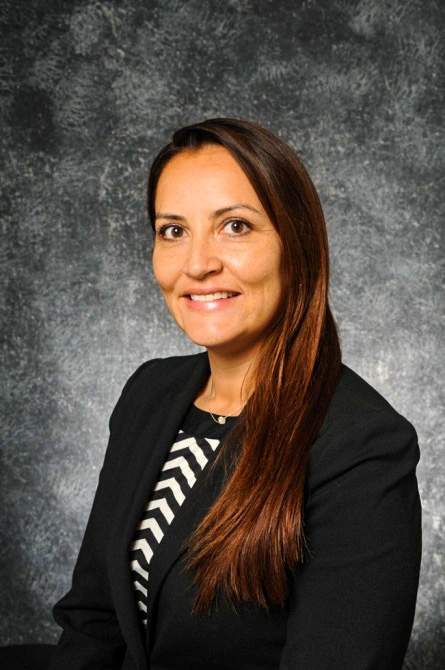Indianz.Com > News > President Biden nominates another Native woman to federal bench
President Biden nominates another Native woman to federal bench
Wednesday, December 15, 2021
Indianz.Com
President Joe Biden continues to make history with his judicial nominations, announcing another Native woman to serve on the federal bench.
The nomination of Sunshine Suzanne Sykes, who is a citizen of the Navajo Nation, is historic in more ways than one. She would be the first Navajo citizen in the federal judiciary and the first Native person to serve on the federal bench in California, the state with the largest number of American Indians and Alaska Natives.
Should she be confirmed by the U.S. Senate, Sykes would be just the fifth Native federal judge actively serving in the country. And she’s only the third Native woman in U.S. history to be chosen for the bench.
“These choices also continue to fulfill the President’s promise to ensure that the nation’s courts reflect the diversity that is one of our greatest assets as a country — both in terms of personal and professional backgrounds,” the White House said on Wednesday as Sykes and eight other nominees were announced.
Sykes comes to the stage with significant experience in law and public policy. She currently serves as a judge for the Superior Court of Riverside County, home to a large number of tribes in southern California. She is the first Native judge in the county’s history.
“Riverside has one of the largest Native communities in the state, with something like 17 tribes, and not one Native judge, so the bench was not reflecting the community,” Sykes told Stanford Lawyer Magazine, explaining why she set her sights on serving the county.
Before becoming a judge, Sykes worked as an attorney for the county, handling juvenile dependency issues and matters affecting abused and neglected children. Her work helped shape her desire to ensure that judges understand key federal laws like the Indian Child Welfare Act.
“When I was a lawyer working with juveniles, I saw a lot of instances across the state where judges didn’t really understand the Indian Child Welfare Act and the reasons behind its passing in Congress in the 1970s,” Sykes told the magazine of Stanford Law School, where she earned her J.D. “They didn’t really understand Native culture.”
Judge Sunshine Suzanne Sykes: Nominee for the United States District Court for the Central District of California
The following biographical information about Sunshine Suzanne Sykes was provided by the White House.
Judge Sunshine Suzanne Sykes has served as a California Superior Court Judge on the Superior Court of Riverside County since 2013. She currently presides over a civil litigation department and is the presiding judge of the appellate division. From 2005 to 2013, Judge Sykes served as a Deputy County Counsel in the Office of County Counsel for Riverside County, handling litigation on behalf of government entities and serving as a juvenile dependency trial attorney representing the California Department of Public Social Services on matters concerning abused and neglected children. From 2003 to 2005, Judge Sykes worked as a contract attorney for the Juvenile Defense Panel at the Southwest Justice Center. From 2001 to 2003, she was a staff attorney for California Indian Legal Services. Judge Sykes is a member of the Navajo Nation and is a descendant of the Coyote Pass-Jemez Clan.
Judge Sykes received her J.D. from Stanford Law School in 2001 and her B.A from Stanford University in 1997.
Related Stories
Indian Country cheers nomination of Muscogee Nation citizen to federal bench (May 13, 2021)
Search
Filed Under
Tags
More Headlines
Native America Calling: Safeguards on Artificial Intelligence
NAFOA: 5 Things You Need to Know this Week
Chuck Hoskin: Cherokee Nation takes the lead for our environment
Native America Calling: Earth Day assessment for Native peoples
Cronkite News: Gathering addresses ‘epidemic’ among Native people
VIDEO: Cody Desautel on tribes and federal forest management
AUDIO: Legislative Hearing on Discussion Draft of Forest Management Bill
Native America Calling: Remembering the 1974 Navajo border town murders
Native America Calling: Can the right approach close the Native immunization gap?
Cronkite News: Long COVID cases remain high in Arizona
Native America Calling: Eyes in the sky for development, public safety, and recreation
Native America Calling: Three new films offer diverse views of Native life
NAFOA: 5 Things You Need to Know this Week
Chuck Hoskin: Cherokee Nation works toward cure for arthritis
Native America Calling: Protecting young people from the down sides of social media
More Headlines
NAFOA: 5 Things You Need to Know this Week
Chuck Hoskin: Cherokee Nation takes the lead for our environment
Native America Calling: Earth Day assessment for Native peoples
Cronkite News: Gathering addresses ‘epidemic’ among Native people
VIDEO: Cody Desautel on tribes and federal forest management
AUDIO: Legislative Hearing on Discussion Draft of Forest Management Bill
Native America Calling: Remembering the 1974 Navajo border town murders
Native America Calling: Can the right approach close the Native immunization gap?
Cronkite News: Long COVID cases remain high in Arizona
Native America Calling: Eyes in the sky for development, public safety, and recreation
Native America Calling: Three new films offer diverse views of Native life
NAFOA: 5 Things You Need to Know this Week
Chuck Hoskin: Cherokee Nation works toward cure for arthritis
Native America Calling: Protecting young people from the down sides of social media
More Headlines
